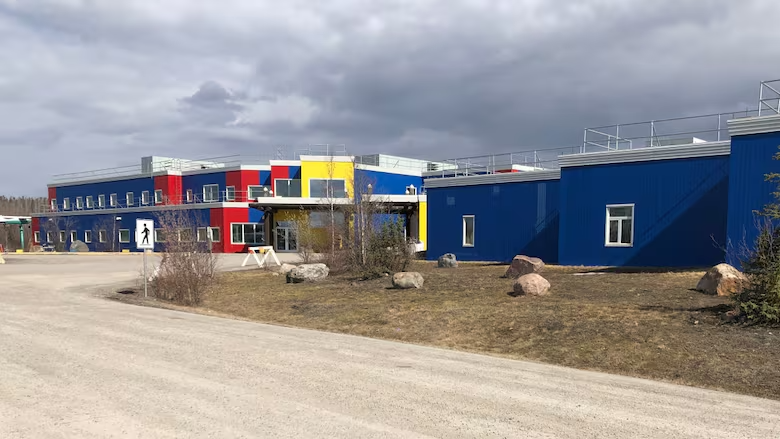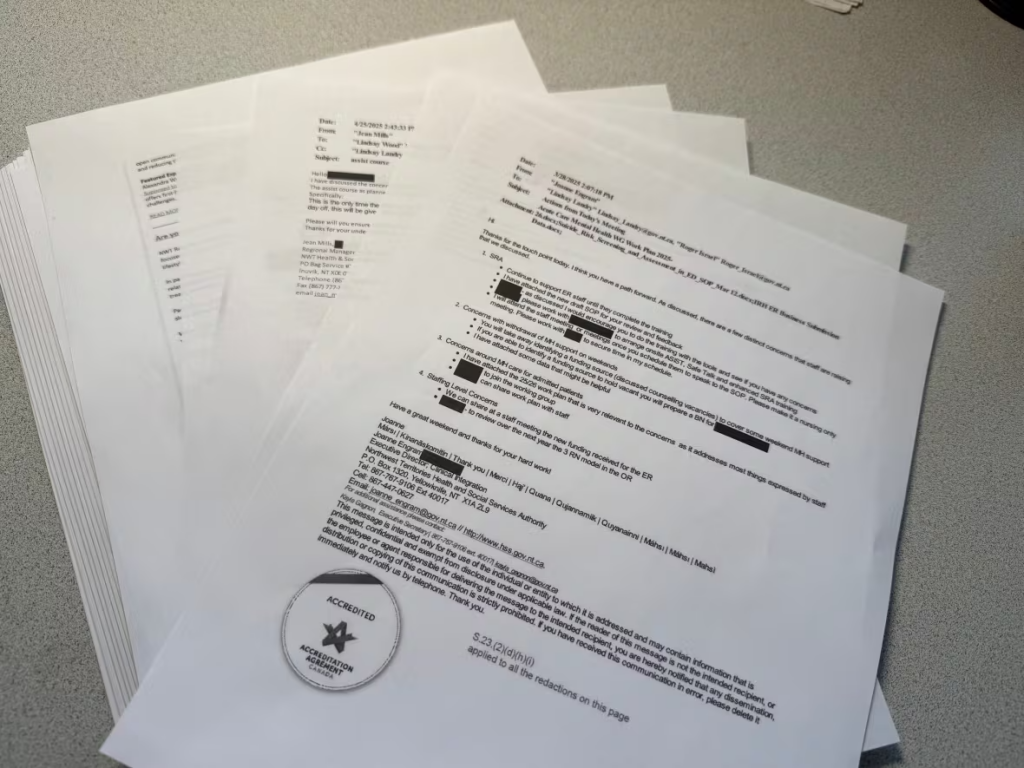Inuvik hospital workers decry loss of weekend mental health services, emails show

N.W.T. health authority says working on weekends is not sustainable for social work team
Emails from Inuvik, N.W.T., health-care workers detail serious concerns around the loss of weekend mental health services at the town’s hospital and the toll that loss is taking on local nurses.
CBC News obtained the emails that were addressed to territorial government officials through an Access to Information and Protection of Privacy (ATIPP) request received in July.
These emails include concerns from nurses and locum doctors about the lack of an on-call medical social worker on weekends and how mental health responsibilities are now falling on nurses.
The Beaufort Delta region, which includes Inuvik, has among the highest suicide rate in the N.W.T, according to a 2022 report from the N.W.T. Coroner Service.
“Our suicide rates in the Beaufort Delta are high, and instead of increasing services, we are taking them away,” wrote one nurse on March 25, 2025.
The lack of mental health workers on the weekend, when our needs are often the highest is very concerning and doing our region and people a great disservice.– Inuvik nurse
The nurses’ concerns came in response to an email sent that month by Lindsay Landry, the Beaufort Delta director of patient care services for the N.W.T. Health and Social Services Authority (NTHSSA).
The email informed nurses that on-call mental health weekend coverage would end on March 30.
“Why? While this is not a funded position, the primary driver is sustainability of the social work team,” Landry wrote. “The team is unable to provide this support while fulfilling core job responsibilities without impact to day-to-day clinical needs.”
This isn’t the first time the service has been unavailable. It was also suspended in October 2024. Stacey Christie, a regional manager of community wellness with the NTHSSA, said in an email at the time that this was because they only had two counselling staff and on-call coverage would mean they would be working 12 days straight with two days off.
Nurses say they aren’t getting enough training
After losing the on-call medical social worker position in March, suicide risk screening and assessments fell on nurses working at the hospital. In the email, Landry cites that this is a responsibility for all nurses working for the N.W.T. government.
“Nursing is required to develop competency in suicide risk screening, and assessment. You are welcome to collaborate with a physician or social worker on site, which may look like observing at first. However, please note that this is required of all health-care providers.”
Landry continued to write that nurses would now be accountable to maintain their competency in suicide screening and risk assessments.
Nurses were required to watch a 30-minute training video as a result of the additional responsibilities.

Multiple nurses wrote emails to their colleagues and NTHSSA directors saying this was insufficient.
“Mental health is a nursing specialty that takes years of schooling and training to become experienced and comfortable in effectively providing appropriate and adequate care to those in need,” one wrote.
Meghan Hobbs, the territorial lead for suicide and crisis response, acknowledged the criticism of the 30-minute training video in her response to the emails and said she was working on an extended training module to replace it.
Another nurse sent an email that highlighted the specific challenges they face in the region.
“The mental health needs in our region are substantial and complicated with addiction and generational trauma,” the nurse wrote.
“The lack of mental health workers on the weekend, when our needs are often the highest, is very concerning and doing our region and people a great disservice.”
Mental health patients advised to call helplines
Hospital staff were told to advise patients who were hospitalized over the weekend and requiring immediate support to call 811 or other helplines to speak to a counsellor.
During the shortages in 2024 one nurse said they did advise people to call helplines, but that wasn’t an effective option.
“At that time, we indeed had [patients] so desperate for actual professional counselling services in the midst of their crisis that they did call, and when it came out in their conversation that they were admitted in a hospital, they were told that the hospital should have what they need, and that they shouldn’t be calling if they are already in a hospital,” she wrote.
“This happened multiple times, until staff decided to stop giving the resource out as a substitute for weekend coverage.”
Locums also concerned
It wasn’t just nurses flagging their concerns in the emails obtained by CBC News; 14 locum doctors also sent a joint email to NTHSSA directors advocating for more resources. Locums are generally southern doctors who travel north to fill gaps.
“Our security staff is not equipped with these skills. Our nursing colleagues are already stretched thin. We often default to relying on RCMP when we are concerned that patients may harm themselves or harm others,” one Inuvik locum wrote.
“This is not an appropriate role for RCMP officers, and more importantly, it is often a re-traumatizing experience for our predominantly Indigenous patients.”
The doctors called for more mental health support — especially on-call and after-hours — and additional support for nursing staff, “who so often bear the brunt of verbal and physical assault from patients in crisis.”
They also asked for more funding, de-escalation and trauma-informed care training for security staff.
Private counselling currently offered
CBC News reached out to the territorial government to ask if the situation has changed since March and if nurses are still expected to provide suicide risk assessments on the weekends, but didn’t receive a response by deadline.
In May 2025, CBC News reached out to the territorial government about after-hours mental health support in Inuvik.
Krystal Pidborochynski, a spokesperson for the NTHSSA, wrote in an email at the time that Inuvik does use a private service for after-hours mental health services.
“Patients are provided with this information and if the patient consents, hospital staff will contact the service and support will be arranged,” Pidborochynski said.
However, the emails obtained by CBC states that those service providers were not on-call 24/7 and they can’t provide suicide risk screening or assessments.
Related stories from around the North:
Canada: ‘We need help’: politician in Nunavut, Canada wants more mental health supports in his community, The Canadian Press
Finland: Climate change worries Finland’s young reindeer herders, Yle News
United States: Craft space aims to teach Alaska Indigenous women skills — and help beat addiction, Alaska Public Media



